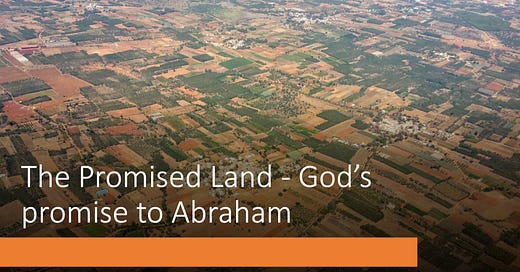The Promised Land - God’s promise to Abraham
Psalm 105:1-2, 3-4, 6-7, 8-9. January 11, 2023 - Wednesday, 1st Week in Ordinary time
Psalm 105 has 45 verses, but we sing today only 9 of them. The entire psalm reflects upon the history of Israel from Abraham till the entry of Israel into the Promise Land. In Genesis 12, God called Abraham and promised him numerous descendants and land to live in (see Gen 12:1-3; 7). Then, God enters into covenant with Abraham, saying: “I am the LORD who brought you out from Ur of the Chaldeans to give you this land to possess” (Gen 15:7; 18). The psalm ends the narration of Israel’s history with the fulfilment of this promise stating that God gave His people “the lands of the nations” (Ps 105:44).
The psalm celebrates God’s faithfulness to the promise given to Abraham. This reminds us of the song of Zechariah sang after the birth of his son, John. However, instead of mentioning the promise of the land, Zechariah sings about a promise of being delivered from enemies and serving the Lord “without fear, in holiness and righteousness before him all our days” (Luke 1:74-75). For Zechariah, the birth of his son marks the beginning of the fulfilment of God’s promise that goes far beyond possession of the land. It is about God’s salvation, the forgiveness of sins, enlightening our darkness, and leading us into the way of peace (see Luke 1:76-79).
The scholars date this psalm to the time of Babylonian exile. It aims to encourage Jewish people who lost their land to trust God’s faithfulness no matter what. After all, Abraham also left the promised land and journeyed to Egypt and so did Jacob with his entire family. Moreover, although the people were held for many years in slavery in Egypt, God did not forget them. Through Moses, He delivered them from Egypt and brought them to the Promised Land. Thus, the history of Israel is presented as a source of comfort and encouragement. Since the Lord remembers his covenant forever (Ps 105:8), there is no need to get discouraged and lose hope.
The promise of the land to Abraham’s descendants has played an important role in the history of Israel. The promise indicates how important is for a nation to have its territory, to have a space where one feels secure and can freely worship God. But this promise has also been misinterpreted by all those who in the name of God colonised and oppressed other nations.
It is worth remembering that in the Christian tradition, the promised land is no more here. It is not connected with any particular piece of land, but it is described as new heaven and earth, and a new Jerusalem where “death shall be no more, neither shall there be mourning, nor crying, nor pain anymore, for the former things have passed away” (Rev 21:4). I look forward to seeing this Promised Land.




